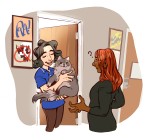There is no doubt that UCLA Residential Life takes the resident assistant hiring process very seriously. Hopeful applicants must undergo an extensive background check and go through many hours of training.
Resident assistants are students who are hired by Residential Life to make dorm floors a safe and welcoming place by fostering a sense of community, counseling residents regarding problems and helping to maintain a safe and positive resident atmosphere. They receive free housing and a meal plan in exchange for fulfilling these duties under the guidance of resident directors and other professional staff members.
However, it is not uncommon that some RAs get by with bare minimum programming and by breaking some of the rules they are meant to enforce. After all, they are students – it should come as no surprise that some may break the rules, especially since they know the system and how to get around it.
These transgressions do more than just stain the integrity of Residential Life’s rules. They can hinder the quality of residents’ living environment, which ironically undermines the very purpose of having RAs. As such, Residential Life needs to implement an online system where residents can directly submit complaints about RAs to a committee that can assess the submissions and determine whether or not to take disciplinary action.
Residents usually do not concern themselves with what their RAs do in their personal time and it would be wrong to say that all RAs are not fulfilling their job duties. However, that does not mean mediocre ones do not exist and if their behavior impacts their residents and their floor’s living environment, that’s a problem.
In an email statement, UCLA spokesperson Rebecca Kendall revealed that in the most recent Rate the Hill survey, 2.5 percent disagreed or strongly disagreed with the statement that their RAs took the time to understand their needs and concerns. And another 5.1 percent did not think that their RAs created a sense of community on the floor or building.
These statistics do not seem far-fetched, as some RAs succumb to an apathetic attitude throughout the year. For example, there have been several times when my own RA has failed to enforce certain rules in our building simply because there have been no formal complaints filed. Whether it is residents violating noise regulations or drug and alcohol policies, my RA does not seem fazed by misconduct unless someone explicitly makes their discomfort known.
Furthermore, the current system of reporting rogue RAs isn’t working. Theoretically, residents with complaints about their RAs can just pick up a phone and make an appointment with their resident director – as Kendall assumed in her email statement. It is clear from the several student sources who expressed reservations to me of reporting their RA’s misdoings that students are generally unwilling to reveal their identities when exposing serious matters.
What’s more, the Rate the Hill survey is currently the only online form put in place for residents to submit suggestions and complaints, and even then, this survey is only administered once every quarter. It would be a lot more reasonable to provide residents with the proper tools to submit feedback at all times throughout the year.
Jay Manzano, a second-year political science student and RA at Rieber Hall, stated that an electronic submission system would help improve job performance.
“There is a possibility that some RAs become disengaged throughout the year,” he said, “I think having a system that can provide continuous feedback is very valuable.”
With an online system in place, residents would be able to submit complaints or suggestions to a committee that could take disciplinary action. Creating an easy, accessible online system can help ensure that student complaints are dealt with effectively and can help keep errant RAs accountable.
The system should also give students the option of remaining anonymous. Although there’s always the small possibility of false reports, remaining anonymous will encourage more residents to come forward if they have an issue with their RA or other residents in general without fear of ostracization. What’s more, the claims would be verified by a Residential Life committee, eliminating the chance of unwarranted disciplinary action.
There is no doubt that there are some incredible RAs working on the Hill, but if UCLA supposedly only chooses the best people to look after their dorm floors, it is fair for students to expect nothing less than the best from their RAs when they move in.
If Residential Life seeks to maintain a safe and welcoming environment with the help of housing regulations, it should ensure that all residents work towards that goal, especially RAs. In exchange for free room and board, RAs should be role models for their residents – not only during the enthusiastic welcome week, but the entire school year.

RAs have so many students to take care of and they have night shifts that cover duty in the entire building. Much of their work is done behind the scenes. Weekly floor meetings are done so students come voice their opinions or they can also slide notes anonymously under their RAs doors. There are plenty of opportunities for residents to communicate with their RAs, just speak up.